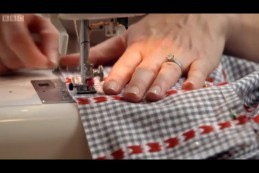Earlier this year Louie CK told us that “The Whole Country of Australia Rips TV”, and it’s a problem that our Government is trying to do something about.
Last month our current Minister for Communications, Malcolm Turnbull, hosted an “Online copyright infringement forum”, a chance for interested parties from industry, academia and the public to discuss ‘the problem’. What soon became clear is that ‘the problem’ isn’t everyone’s problem, nor was everyone interested in exploring the issue from the same angle or with the same ‘evidence’. Also, Australia isn’t the only place with a ‘problem’.
Housekeeping
The panel for the night took the stage. Above them beamed “Housekeeping” on the big screen. While the announcement was more likely for us in the crowd (“here’s the loos, here’s the fire exits”), it was quite a powerful visual. Here were the people who want to ‘keep the house’ for us on the arse end of the world when it comes to geography and access to international television.
They were ‘industry’ players including (left to right in order, I think): Writer/Producer Peter Duncan (whose work includes the Australian and US versions of television dramedy Rake); Graham Burke, Co-Chief Executive Officer of distributor Village Roadshow Limited; Jane Van Beelen, Executive Director of the once monopolistic and still very dominant national telecommunications provider Telstra; Richard Freudenstein, Chief Executive Officer of local Pay TV empire Foxtel; Malcolm Turnbull, Federal Minister for Communications and man who explained the potential of an online, national broadband network using a white board and textas (true, here’s proof); David Buckingham, Chief Executive Officer of internet provider iiNet Limited; Brett Cottle, Chief Executive Officer of music publishing association APRA/AMCOS; and Alan Kirkland, Chief Executive Officer of consumer advocacy magazine, Choice.
Are you still awake? Are you imagining this was going to be a riveting discussion?
Actually, the discussion, slides and slight fisty cuffs weren’t bad, and here’s a link to the full thing at the end if you’re wanting to relive the magic for yourself.
However what was interesting were the things that weren’t discussed or shot down – namely the place of actual research, verifiable evidence and formal acknowledgments that a ‘for us or against us’ attitude doesn’t clearly define who is the ‘us’ and who is the ‘not us’.
The discussion, which was meant to be a response to the government’s invitation for responses to their Online Copyright Infringement Discussion paper , started as a pitching space for each party, with Turnbull punctuating staged questions with slides that had pretty pictures, lots of numbers and not a lot of clearly referenced sources. Perhaps this was because no one felt the need to really back up claims that we’re a bunch of convicts here (we certainly have a history of stealing land and housing convicted criminals), or maybe it was because it’s easier to look at ways to punish those ‘doing the wrong thing’ rather than looking at why they’re doing it in the first place.
Questions of ‘how we might stop the pirates’ were batted between the telcos and content providers, with each arguing over how an ‘infringement notice’ system (aka “graduated response”) might happen. Whose job would it be to find pirates in the first place? Should an internet provider be responsible for finding naughty people using their serves for evil rather than good? Should content providers be responsible for chasing thieves given they apparently stand to benefit most from recovering lost revenue.*
*And, as Choice sensibly pointed out, when might those who actually watch, listen and enjoy be given a chance to contribute in a meaningful way? Audiences enjoy creative industries- why are we considered the bad guys when we are simply asking for more access, more often?
How can academics help?
Although not actually allowed on the stage or near a microphone for longer than a few minutes, there’s some interesting work starting to emerge from people whose job it is to do more than just speculate or push their own company’s agenda. One such person was Dr Rebecca Giblin who recently published an exhaustive study evaluating evidence from around the world about whether this kind of system actually works.
Dr Giblin explained that there is remarkably little credible evidence to suggest that preventative measures achieve any of their aims. She introduced herself as being “not here as something who’s pro or anti graduated response, I’m here as someone who’s pro evidence.”
Her full study – which, unlike almost all the evidence it evaluates, has been peer reviewed, and can be downloaded here. She has also undertaken a separate study, commissioned by the ADA, about the likely effects of the government’s proposed changes on non-ISP intermediaries like libraries, schools and cloud providers, available here.
On the night Giblin was, quite disgracefully I think, pretty much ‘shut up’ from the panel and floor when it became clear she needed more than 30 seconds to demonstrate her point. What? Are you saying that something like copyright, distribution, access and audience engagement online is more complicated than a soundbite? Seriously!!??
Thankfully much of the twitters came to her defense at the time – lots of fangirl/boy stuff happening on the feed as it happened – a way for those of us in the peanut gallery to say ‘shit yeah!’ without getting thrown out. Let’s listen to someone who’s looking at this without a vested interest, hey?
So where now?
A highlight, and continued problem, is that many of those ‘doing the housekeeping’ for Australian audiences and artists really don’t seem to get it on the whole. When the whole ‘downloading illegally is the same as stealing something from a shop’ analogy came up again, it hilariously turned on the wrong people. The shoplifting thing was raised as part of the ‘I’m not paying, no, I’M NOT PAYING’ argument between content creators, providers and distributors, with the metaphor extended to ask “so, if this was a shop, who should pay for the security guard to protect merchandise”? When someone suggested that in a big shopping centre it should be Centre Management footing the bill, which in this case would be Turnbull and the Federal Government, the Minister swiftly changed the channel. Ha.
Given it’s a government that’s slashed arts funding already including grants, councils and threats to public service broadcasting (again), seems industry can get a taste of its own medicine. You lot will just have to sit back and wait until (if ever) the powers that be feel like delivering.
Dr Liz Giuffre is a lecturer and researcher in Media, Music and Cultural Studies at Macquarie University, Sydney, Australia. Her work focuses on music and television in particular, including audience studies, fandom, cultural history and cultural industries in transition.





